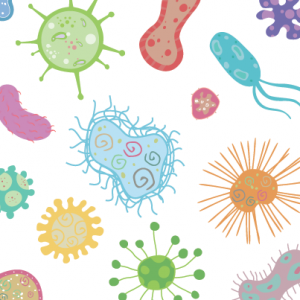 The mouth harbors a diverse and plentiful microbial community due to its hospitable environment. It is warm, nutrient-rich and maintains an ideal pH balance. The highly diverse microflora inhabits the various surfaces of the normal mouth- gums, teeth, tongue, and cheeks. What many people don’t realize is that most of the bacteria are beneficial organisms and live in harmony with each other and the human body.
The mouth harbors a diverse and plentiful microbial community due to its hospitable environment. It is warm, nutrient-rich and maintains an ideal pH balance. The highly diverse microflora inhabits the various surfaces of the normal mouth- gums, teeth, tongue, and cheeks. What many people don’t realize is that most of the bacteria are beneficial organisms and live in harmony with each other and the human body.
The “Bad Guys” of Dental Bacteria
Interestingly, a new born baby’s mouth does not contain bacteria, but becomes colonized rapidly in the early stages of life. Nobody knows for sure how many different bacteria species there are. Estimates in the oral cavity alone vary between 500 to 650 different species. Only a few specific species are believed to cause dental caries, including Steptococcus mutans, considered the most important bacteria involved with tooth decay. However, the type of bacteria varies according to the progress of tooth destruction.
This harmful bacteria collects around the teeth and gums forming a sticky, creamy-colored mass called plaque. Some areas of the mouth collect plaque more commonly due to less salivary flow, such as grooves in molars and between teeth. The oral cavity actually contains the only known part of the human body that does not have a regulated system of shedding surfaces: the teeth. This allows plaque to adhere to the surface of teeth for long periods of time. At first, plaque is soft enough to come off easily with a toothbrush. However, it starts to harden within 48 hours. After about 10 days, the plaque becomes dental calculus, called tarter, and is now difficult to remove.
Villains Love Carbohydrates
Sugars from candy, soft drinks, and fruit juice can play a significant role in tooth decay. When sucrose (table sugar), the most common of sugars, coats the surface of the mouth, some intraoral bacteria interact with it. The result is lactic acid, which decreases the pH in the mouth. This demineralization allows for greater bacterial invasion deep into the tooth.
Carcinogenicity, or the extent to which tooth decay is likely, depends heavily on how long the sugar remains in the mouth. Surprisingly, it is not the amount of sugar ingested but the frequency of sugar ingestion that is the most important factor in tooth decay.
Bacteria’s Kryptonite
Oral hygiene is key to battling the bacteria “bad guys”. Brushing your teeth twice a day will reduce dental plaque and food particles collecting around your teeth. Additionally, it is imperative to floss daily to wipe all your enamel surfaces free of plaque to discourage bacterial growth. Good general oral-health habits can usually prevent enough bacterial growth to keep tooth decay from starting.
